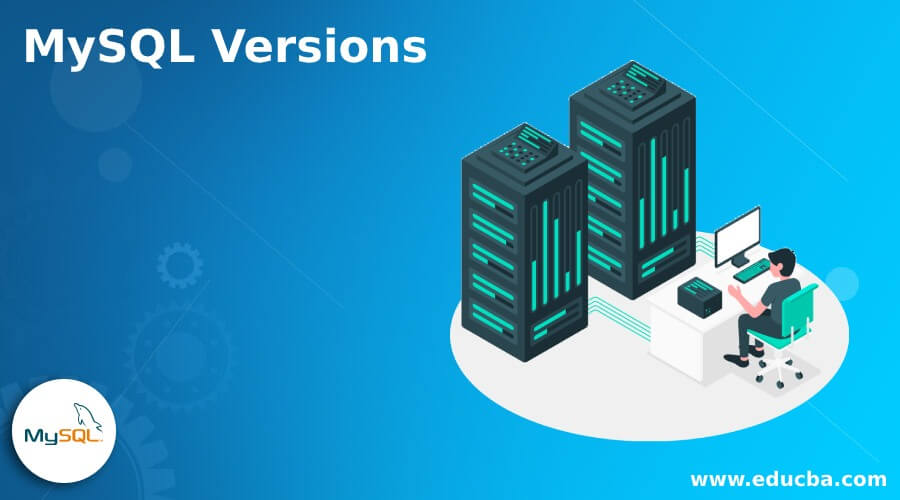Updated June 8, 2023

Introduction to MySQL Versions
MySQL Versions is a technique that follows a sequence of numbering to track some information on MySQL working for development and maintenance purposes. This is a challenging way to keep updated on the current and upcoming versions, which contain improved functions and resolved solutions to any error bugs found in the previous versions.
In software development, versioning involves assigning unique version numbers or names to a particular set of software that developers create and release. We use the name version 1.0 to denote the initial release of any program software. Any industry or company standards do not dictate a specific format rule for the version, allowing them to employ their own planned methods for assigning it.
Different MySQL Versions
When we want to install the MySQL server in our system, firstly, we must select the version and the distribution format to apply. You can find two methods for installing the MySQL server. The primary one is the Development Release, which incorporates the latest features, but we do not recommend using it in production environments. The second one is General Availability Release (GA), which defines a stable or production release and is majorly applicable for production. Thus, a user must agree to choose the most current GA release.
To work with MySQL, the currently supported version is v5.8. This version incorporates several notable changes, such as adding and removing new features, bug fixes, and security issue resolutions. This specific version comprises the release history from ange MySQL 8.0 to 8.0.21. This means the support is available from April’2018 to April’2026.
The four attributes alpha, beta, gamma, and finally, production recognize MySQL versions.
1. Alpha
This MySQL version denotes the struggle period of the development process where new advanced functions and incompatibility alterations are expected to be done. Here the developers work out to remove specific errors and try out the unique features of the MySQL server.
2. Beta
This attribute defines that the version is completed but must be tested thoroughly. The main changes are not predictable.
3. Gamma
It says that the previous beta version has become a bit more or less stable, so we can proceed with discovering and resolving the errors.
4. Production
This final attribute in the MySQL version is responsible for having an impression on MySQL developers, informing them that the version is now ready, stable, and mature enough to be used for mission-critical commitments.
MySQL developers can be pleased with minor extensions, but compatibility problems with several production versions may also occur. According to the MySQL documentation, a new version should always hold alpha status. Again, the status rises to status beta, gamma, and at last, production with higher version numbers. MySQL users and developers must use, which has status production.
In 2008, the MySQL AB was developed by Sun Microsystems. MySQL 5.0, the first internal release, was on 23 May 1995, but as the documentation, version 5.0 had some shortcomings that appeared in tables. Again, with the release of MySQL version 5.1, it became evident that the version lacked adequate support for data warehousing and encountered issues such as incorrect result bugs, crashes, and instability when handling a single query across different CPU cores. As a result, on January 27, 2010, Oracle acquired Sun Microsystems.
Afterward, subsequent launches introduced further improvements and new functions.
Let us see the history of the release of previous MySQL versions listed as follows:
1. MySQL 5.1
The developers released MySQL on November 27, 2008, as a production version, and they discontinued its support in December 2013. It included the releases of MySQL server 5.0 to MySQL server 5.1.73 versions, containing event scheduler, plugin API, partitioning, server log tables, and row-based replication.
2. MySQL 5.5
Its release date was 3 December, 2010, and the end of support was Dec 2018. It included the releases of MySQL server 5.5 to MySQL server 5.5.62 versions with default storage engine InnoDB supporting referential integrity constraints, transactions, and other improved features.
3. MySQL 5.6
The developers released this version on February 5, 2013, and the support for it concluded in February 2021. It included the releases of MySQL server 5.6 to MySQL server 5.5.45 versions with enhanced performance to the query optimizer, fresh NoSQL-style Memcached APIs, advanced transactional output in InnoDB, TIMSTAMP column type, and can accomplish huge tables, etc.
4. MySQL 5.7
The release of MySQL took place on October 21, 2015, and its support will end in October 2023. It includes the releases of MySQL server 5.7 to MySQL server 5.6.27 versions consisting of provision for a native JSON data type well-defined by RFC 7159.
5. MySQL 8.0
The developers released this latest version on April 19, 2018, and its support will continue until April 2026. It includes the releases of MySQL server 8.0 to MySQL server 8.0.21 versions. It consists of atomic and crash-safe DDL sentences, NoSQL Document Store, JSON Extended syntax, also new functions like enhanced sorting, JSON table functions, data dictionary, account and security management, resource and table encryption management, InnoDB enhancements, character set support, window function, data type support optimizer enhancement, and partial updates.
Conclusion
It defines the production, which shows the process of stable versions with substantial changes generally made with proper plans and corrections over old versions of MySQL or any other software applications. When we increase the version number, it indicates that we have implemented new features, patched security holes, and fixed bugs collectively in the program software, resulting in improvements.
Recommended Articles
We hope that this EDUCBA information on “MySQL Versions” was beneficial to you. You can view EDUCBA’s recommended articles for more information.

